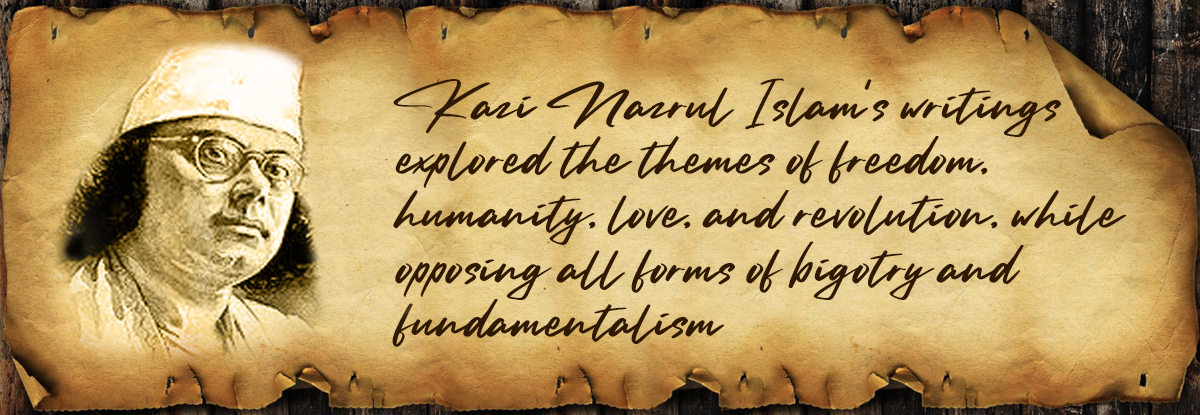KAZI NAZRUL ISLAM
KAZI NAZRUL ISLAM ONCE STATED, ʻEVEN THOUGH I WAS BORN IN THIS COUNTRY, I DONʼT BELONG TO JUST THIS PLACE; I BELONG TO THE WORLD.ʼ KNOWN TODAY AS BIDROHI KOBI, OR THE REBEL POET, IN BENGALI LITERATURE AND THE BULBUL, OR NIGHTINGALE, OF BENGALI MUSIC, KAZI NAZRUL ISLAM WAS CERTAINLY ONE OF THE MOST INSPIRING PERSONALITIES OF UNDIVIDED BENGAL
For a significant part of his life, Nazrul was considered the pioneer of post-Tagore modernity in Bengali poetry. The several ways in which he expressed himself include poems, short stories, plays and political activities. Most of his works protested against the slavery, communalism, feudalism and colonialism forced upon India by the British rule. His music too was most original and creative. He brought traditional melodies to the common man by fusing different elements of North Indian classical music.
Born in 1899 in the district of Burdwan, Nazrul lost his father at an early age. He was nicknamed ʻDukhu Miaʼ by the village folk because of the hardships and misery he faced in his early life. At the age of 10 he became the muezzin of the village mosque and started teaching at the local school. He learned about poetry, drama, and literature while working with a rural theatrical group.
In 1917 he enrolled in the British Indian Army and after serving in the Mesopotamian campaign during the First World War, he established himself as a journalist in Calcutta. He attacked the British Raj and preached revolution through his poetic works, such as Bidrohi and Bhangar Gaan, as well as his publication Dhumketu. His nationalist activism during the Indian independence movement led to his frequent imprisonment by the colonial British authorities. While in prison, Nazrul wrote Rajbandir Jabanbandi. Exploring the life and conditions of the downtrodden masses of the Indian subcontinent, he worked for their emancipation. His writings greatly inspired Bengalis of East Pakistan during the Bangladesh Liberation War. Nazrul also wrote and composed music for nearly 4,000 songs known as Nazrulgeeti. In 1942, at the age of 43, he began to suffer from an unknown disease, losing his voice and memory. It caused his health to decline and forced him to live in isolation for many years. At the invitation of the Government of Bangladesh, Nazrul and his family moved to Dhaka in 1972. He died four years later, on August 29, 1976.

